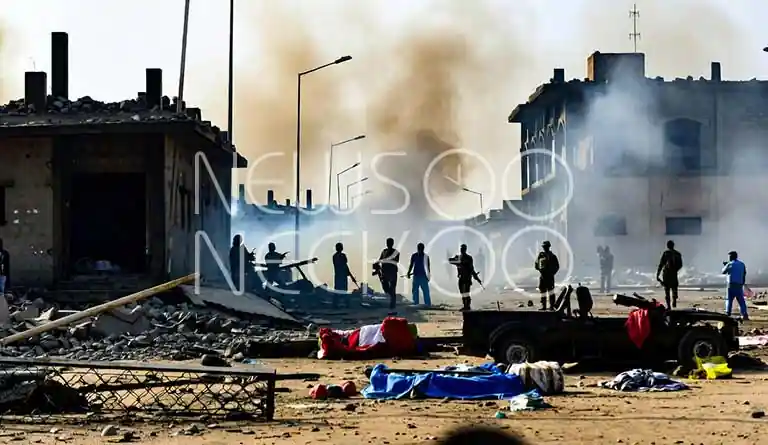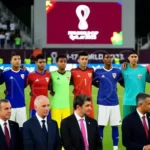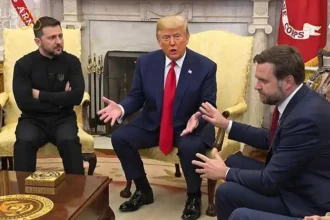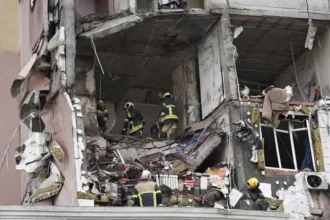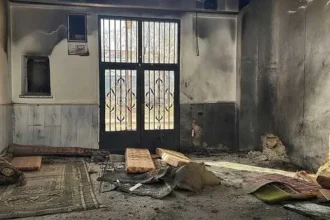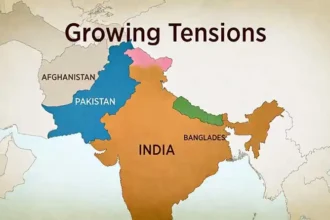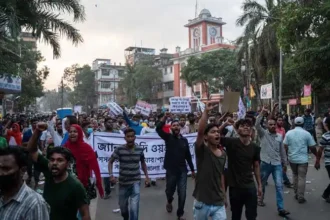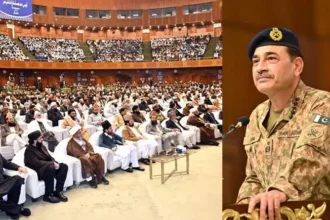A Cry for Sudan: World Powers Issue Desperate Plead as a Nation Tears Itself Apart
In a rare and powerful joint move, the top diplomats of Germany, Jordan, and the United Kingdom have broken through the global noise to issue a stark warning: Sudan is descending into a humanitarian abyss, and the world cannot look away.
CNN Reports: The words echoed in a room far from the bombs and the hunger, but they were meant for the people hiding in the dark. “Catastrophic.” “Unimaginable suffering.” “A grave threat to regional peace.” This was the language chosen by the foreign ministers of three powerful nations, a final, unified alarm bell ringing for a country that many feel has been forgotten.
In a coordinated statement that signals growing international desperation, Germany’s Annalena Baerbock, Jordan’s Ayman Safadi, and the United Kingdom’s David Cameron jointly called for an immediate ceasefire in Sudan. Their demand is not just a routine diplomatic request. It is a direct response to what they describe as a war that has unleashed “unimaginable suffering” on the Sudanese people, creating one of the worst humanitarian disasters on the planet.
For over a year, the world has watched, often from the sidelines, as two powerful military factions the Sudanese Armed Forces (SAF) and the paramilitary Rapid Support Forces (RSF) have turned a nation of 49 million people into a battlefield. But this powerful joint statement suggests a new, more urgent phase of international concern is beginning.
A War Fought on the Bodies of Civilians
To understand why these ministers are speaking now, you must look beyond the political statements and into the shattered streets of Khartoum, El Fasher, and beyond.
This is not a war of distant front lines. It is a conflict fought in family homes, in hospitals, and in the breadlines where people wait for food. The ministers did not shy away from the grim details, pointing to the “indiscriminate” attacks that have killed tens of thousands and pushed millions to the brink of famine.
Imagine a city where the sound of gunfire is as common as the call to prayer. Where the simple act of going to a market can be a death sentence. This is the daily reality for millions of Sudanese. The RSF, with its roots in the notorious Janjaweed militias, has been accused of widespread atrocities, including mass killings, sexual violence, and the looting of entire cities. The Sudanese army, in its effort to dislodge them, has conducted relentless airstrikes and artillery bombardments in densely populated urban areas.
The result is a country on its knees. Over 8.6 million people have been forced from their homes, creating the largest internal displacement crisis in the world. They live in makeshift camps, often without clean water, medicine, or enough food. The United Nations warns that nearly 5 million people are now facing emergency levels of hunger.
You Might Like it: Madagascar Coup: General Randrianirina Seizes Power
Why This Statement, and Why Now?
The joint call from Germany, Jordan, and the UK is significant for several reasons. First, it represents a unified front from both European and key Arab nations, showing that the alarm over Sudan is not confined to one region. Second, the language used was deliberately strong, moving beyond the cautious tones of typical diplomacy to convey a true sense of emergency.
“The scale of human tragedy is incomprehensible,” the ministers stated, making it clear that the world’s failure to stop the war is a moral failure.
But there is another, more practical reason for the timing. The war in Sudan is not contained. Its shockwaves are spreading, threatening to destabilize an already fragile region.
Jordan, a key U.S. ally and a nation of stability in the Middle East, shares a deep concern with Germany and the UK about the regional fallout. The conflict has sent hundreds of thousands of refugees fleeing across borders into already struggling neighboring countries like Chad, South Sudan, and Egypt. This places an immense strain on resources and can create new political tensions.
Furthermore, the power vacuum and chaos have allowed other armed groups, including terrorist organizations, to gain a stronger foothold. The ministers explicitly called the war “a grave threat to regional peace and security,” a clear indication that they fear the conflict could ignite a much wider fire.
You Also Read: Trump ASEAN Summit 2025: Ceasefire, Trade & New Member
The Long Road to Peace
The joint statement is a powerful cry, but the ministers know that words alone cannot stop a war. They have called for the warring parties to return to the negotiating table and to engage in a “good faith” peace process.
They have also demanded that the Sudanese generals allow life-saving humanitarian aid to reach people in need. Currently, aid is being systematically blocked, used as a weapon of war by both sides. Getting food and medicine through is a matter of life and death for millions.
Yet, the path to peace remains incredibly steep. Both the SAF and the RSF believe they can win a military victory. Both are funded by powerful international backers who continue to supply them with weapons, despite UN arms embargoes. The economic interests of foreign nations often outweigh their concern for the Sudanese people.
A Glimmer of Hope in a Dark Hour
For the people of Sudan, this international attention is a desperately needed lifeline. For over a year, they have pleaded for the world to listen, using social media and brave journalism to tell their stories when few international reporters could get in.
This joint call is a sign that their voices are, finally, being amplified at the highest levels. It puts pressure on the warring generals and on the international community to do more.
But the true test will be what happens next. Will other powerful nations, particularly the United States and Saudi Arabia, who have led previous ceasefire talks, add their weight to this demand? Will the UN Security Council, often divided, find the will to take decisive action?
The foreign ministers of Germany, Jordan, and the UK have thrown a spotlight on Sudan’s agony. They have described the nightmare in clear, uncompromising language. The question now is whether the world will finally wake up and act, or if the cries from Sudan will, once again, fade into an indifferent silence. The survival of a nation hangs in the balance.
Author: Yasir Khan
Date: 01 Nov, 2025
For More Updates, Visit Newsneck


